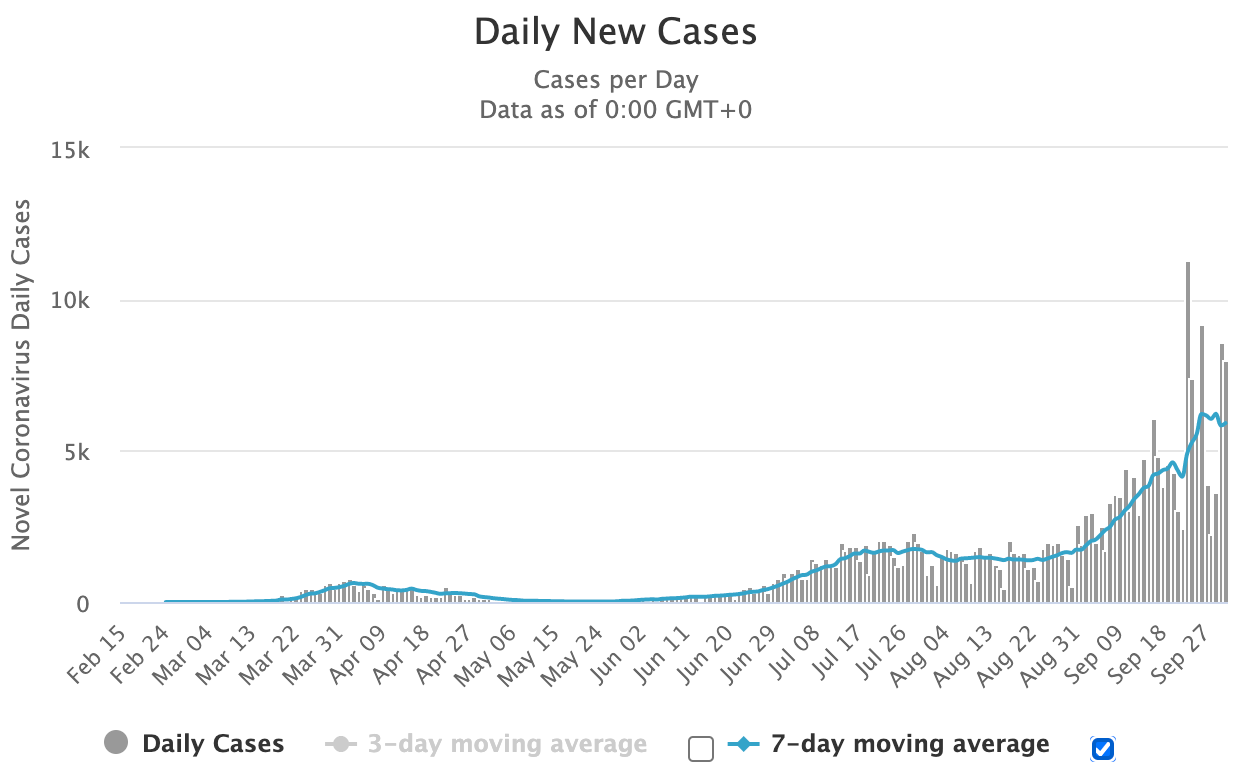🔎 Picks of the Week — October 2
Lebanon PM Steps Down, Israel's New Covid Lockdown, Kuwait Ruler Dies, Saudi Economic Turmoil, Nasser 50th Anniversary, BBC Settles With War Journalist
Hello! Happy October and welcome to a special edition of Picks of the Week where today the focus will be on the Middle East. We’ll travel to Lebanon whose prime minister has resigned just three weeks after taking the job, to Israel where the government has implemented a second nationwide lockdown amid skyrocketing Covid-19 cases, to Kuwait whose iconic ruler has passed away, to Saudi Arabia where a plunge in oil prices and demand have left the Kingdom’s economy in turmoil, to Egypt and the 50th anniversary of the death of its symbolic president, and to the UK where the BBC has settled out of court with one of its former war journalists.
I’m delighted to introduce to you all Aina de Lapparent who excellently crafted today’s newsletter. Aina is currently a freelance journalist and a master’s student in journalism at Sciences Po based in Paris. She’s also interned and freelanced for The Daily Star and Beirut Today in Lebanon, respectively.
Next week will see the re-launch of the podcast, featuring The Wall Street Journal’s Chief News Strategist and Chief Product Technology Officer Louise Story. If you want to continue to support what we’re doing, please subscribe below. Okay, let’s get to it… 🤓🙏
Job Corner
More than 750 journalism jobs and internships and 25 deadlines coming up in the next week in the U.S., UK and Canada at the likes of The Atlanta Journal Constitution, Bell Media, CBC, The Texas Tribune, Reach Plc and The Washington Post. Don’t miss out, subscribe below. 👇

Lebanon PM Steps Down After Three Weeks
Mustapha Adib has stepped down as prime minister just three weeks after he was appointed, after he failed to form a government with the country’s feuding political and religious blocs. As we covered last month, Adib was always going to face an uphill battle to negotiate with Lebanon’s sectorial power-sharing agreement between its three largest religious groups — Shia Muslims, Maronite Christians and Sunni Muslims — which means the speaker of parliament is always Shia, the president always Maronite and the prime minister always Sunni. Adib was a relatively unknown ambassador to Germany just 24 hours before his appointment by four former Lebanese prime ministers, all Sunni Muslims.
A major obstacle in the talks was who would control the finance ministry, with powerful Shia militia groups Hezbollah and Amal insisting on overseeing the country’s finances despite demands for a fresh technocratic government. French President Emmanuel Macron has been the most vocal foreign leader on the future of its former territory, and promised much needed financial aid on the condition that the new government would tackle corruption and implement reforms. After the government collapsed once again, Macron accused Lebanon’s leaders of “collective betrayal”, particularly Hezbollah and Amal.
France’s Macron urges Lebanon to form government
Israel Implements New Covid Lockdown
Israel has ordered all nonessential businesses including synagogues to close amid soaring Covid-19 cases, a week after imposing its second nationwide lockdown. The country averaged a peak of around 600 new daily cases in March and April, but that’s recently rocketed up to more than 6,000 new daily cases. The new measures will last until at least October 10. As part of the lockdown, parliament passed a law banning mass protests during the lockdown, which will prevent demonstrators from forming groups of more than 20 people and will be kept to within 1km of their homes. The government struggled to get the necessary votes to pass the legislation as many saw the move as an attempt to suppress dissent against Prime Minister Benjamin Netanyahu, who’s currently on trial for corruption charges that is set to intensify in January. Multiple people have already been arrested for protesting since the new law passed.
Source: Worldometers 👇


Previous Picks of the Week
🔎 Picks of the Week — September 18
🔎 Picks of the Week — September 11
🔎 Picks of the Week — September 4
🔎 Picks of the Week — August 28
Kuwait Ruler Dies
Moving to Kuwait next as emir Sheikh Sabah al-Ahmad al-Sabah, one of the Middle East’s most influential voices, has passed away aged 91. In power since 2006, Sabah oversaw the country’s foreign policy for more than 50 years and will be remembered positively in most of the Arab world, devoted to peaceful dialogue and regional stability. Most recently, Sabah acted as a mediator in the 2017 Qatar-GCC crisis which saw Saudi Arabia, the U.A.E., Bahrain and Egypt cut diplomatic ties with Qatar and impose an air, land and sea blockade that still exists today. In 2011, Sabah refrained from entering Syria’s civil war and instead chose to host several donor conferences for humanitarian aid. He was also a staunch supporter of Palestinian freedom and refused to follow in the footsteps of the U.A.E. and Bahrain, who normalized relations with Israel earlier this year.
Kuwait has already sworn in Sabah’s 83-year-old half-brother, Sheikh Nawaf al-Ahmad al-Sabah, as its new ruler. Sheikh Nawaf now faces the tough task of resurrecting the country’s economy after new daily Covid-19 cases have averaged between 500-1,000 since the beginning of May. The country is among the world’s 10 largest oil producers and faces a significant recession due to declining oil demand and lockdown restrictions. Fitch Solutions forecast a 2020 contraction of 5.3 percent back in May, but that’s likely to be far larger as the pandemic drags on. The focus now turns to the country’s general election, due to be held at the end of November.
What’s next for Kuwait after the death of its ruler?
Saudi Economy In Turmoil
From one economic crisis to another, Saudi Arabia might be the worst-hit country of them all from the pandemic when it’s all said and done. The government announced its economy shrank 7 percent in the second quarter compared with the same period a year earlier, mostly due to deteriorating oil demand that’s seen the price for a barrel of Brent Crude Oil plunge by around a third compared with this time last year. Meanwhile the country’s unemployment rate soared to an all-time high of more than 15 percent. Several austerity measures have already been announced including the tripling of the country’s value-added-tax to 15 percent, which will hit less well-off households by swallowing a larger proportion of their disposable income. The Middle East Eye helpfully explained the country’s economic crisis in 10 graphics.
Brent crude oil price, % change
Source: Trading Economics 👇

Gamal Abdel Nasser 50th Anniversary
This week also marked the 50th anniversary of the death of Gamal Abdel Nasser, former president of Egypt. Nasser led the country from 1956 until his death in 1970, and left a power vacuum whose effects are still felt today. In the age of European imperialism in the Middle East, Nasser was the first indigenous ruler of Egypt since Cleopatra and represented Arab nationalism and socialism. Arguably his greatest individual feat was victory over the Suez Canal crisis in July of 1956, when Nasser nationalized the canal that connects the Mediterranean and Red Seas across Egypt, and at the time was still owned by the British and French. When Israel, Britain and France invaded in October and November of that year, they faced intense pressure from the Soviet Union, U.S., and UN and quickly withdrew in what became a huge symbolic win for Nasser, who later reopened the canal to commercial shipping.
The Other Side of Suez (BBC Documentary)
Journalist Settles Lawsuit With BBC
We end this week with the news that journalist Natalie Morton has settled her case against the BBC, after she claimed she was bullied into an unnecessary trip to Syria where she was almost killed in an explosion. The 44-year-old news producer suffered minor physical injuries and has been left with severe PTSD which have ended her broadcasting career. A cameraman also suffered 35 shrapnel injuries. Morton said she was bullied into the assignment in Homs by the BBC’s chief war correspondent, Lyse Doucet, who has denied the allegations. The BBC agreed to pay Morton £40,000 to prevent the case from going to court.
That’s all for this week. We’ll be back to normal next week with the re-launch of the podcast, featuring The Wall Street Journal’s Chief News Strategist and Chief Product Technology Officer Louise Story. Want full access to all future podcasts and more than 800 journalism jobs and internships? Subscribe below…



